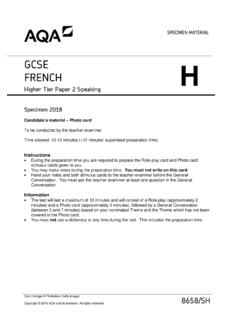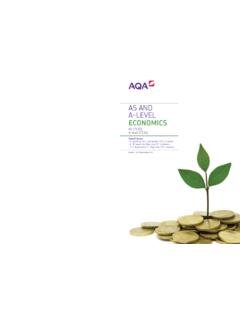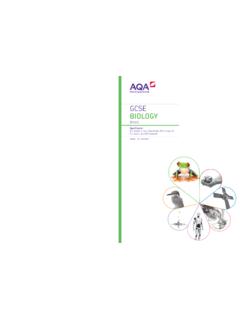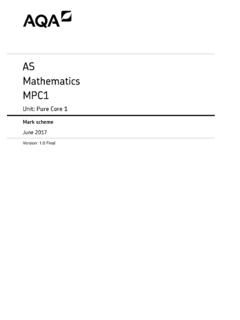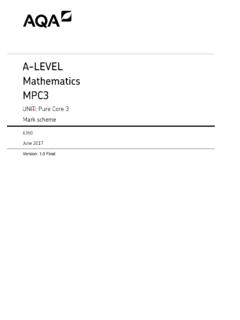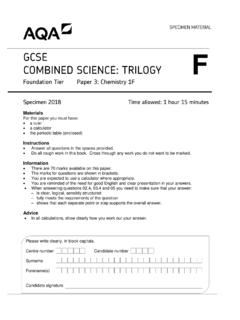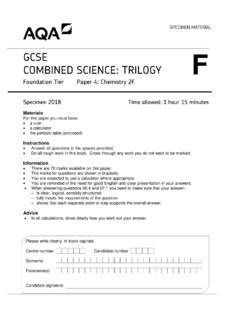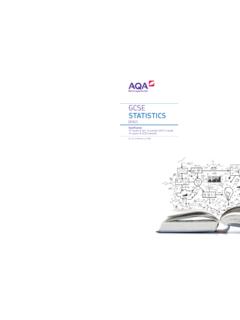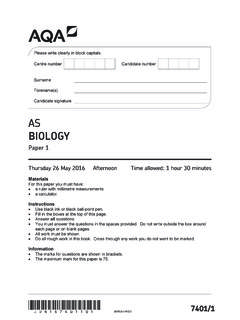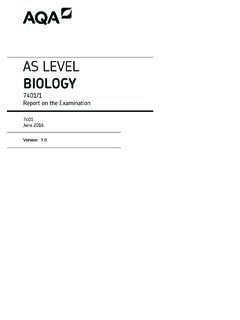Transcription of A-level ENGLISH LITERATURE B (7717/2A) - …
1 SPECIME N MATERIAL A-level EN GLISH LITERATURE B (7717/2A) Paper 2A: Texts and Genres: Elem ents of Cr ime Writing 2015 Morning Ti me allow ed: 3 hours Mate rials For this paper you must hav e: an AQA 12-page answer booklet a copy of the set text(s) you have studi ed for Section B and Secti on C . These texts must not be annotated and must no t contain additional notes or materials. Inst ructions Use black ink or black ball-poi nt pen. Write the information re quir ed on t he front of your answer book. The Examining B ody for this paper is AQA. The Paper Reference is 7717/2 A. Do all rough work in your answer book . Cross through any work that you do not want to be marked. Y ou must answer the questi on in Section A, one questi on from Section B and one questi on from Secti on C.
2 Ov er Section B and Section C , you must write about three texts: at least one must be a pre-1900 poe try tex t and at least one must be a post- 2000 prose text. Information The maximum mark for this paper is 75. T he marks for questi ons are shown in brackets. Y ou will be marked on y our ability to: use good ENGLISH org anise information cl early use specialist vocabulary where appr opriate. In your response you need to: analyse carefully the writers methods explore the contexts of the texts you are writing about explore connections across the texts you have studi ed explore different interpretations of your texts. 2 Turn over Secti on A Answer t he q uesti on in this section. 0 1 Explore the significance of the crime elements in this extract . Remember to include i n your answer relevant deta iled analysis of the ways that Hill has shaped meanings.
3 [25 marks] This extract is taken from the early par t of S usan Hill s novel, A Q uesti on of Identity (published in 2012). T he witnesses have just given thei r evidence in a murder trial . The accused, Alan Keyes, has pleaded not gu ilty. Two crime reporters, Charlie Vogt and Rod Hawkins, are awaiting t he verdict with every expectati on of a conviction. The court was full to overflowing, t he publi c benches packed. Char lie and Rod stood pressed against the doors poised like greyhounds in t he slips. You never got over it, Charlie t hought, your blood pressure went up with the tension and excitement . Be tter than any f ilm, better than any book. There was just nothi ng to beat it, watching t he drama of t he court, eyes on t he face of t he accused when t he word rang out. Guilty . The look of the relatives, as t hey flushed with joy, re lief, exhaustion.
4 And th en t he tear s. These were the fi nal moments when he knew why he w as in his job. Every time. Alan Key es st ood, face pale, ey es dow n, his police minder impassive. Char lie s throat constrict ed suddenly as he looked at him, look ed at his hands on the ra il. Normal hands. Nothing ugly, nothing out of the ordi nary. Not a strangler s hands, whatever t hey were supposed to look like. B ut t he hands, r esting on t he ra il, hands like his own, one beside t he other resting on t he ra il, resti ng on t he ..those hands had ..C har lie did not think of himself as hard-boiled but you did get accustomed. But nothing prepar ed y ou fo r the first time you saw the m an in front o f you, ordi nary, innocent until proved guilty, however clear his guilt was, nothi ng pr epar ed y ou for the sight of a man like Keyes, there in the flesh, a man w ho had str a ngled thr ee el derly women.
5 Nothing. He couldn t actually look at Keyes at all now. The lawyers sat together, shuffling pape rs, fi ddling with box lids, not looking at one another, not murmuring. Just waiting. And t hen t he door opened and t hey were filing back, concentrating on taki ng their seats, faces showing the strain, or else blank and showing nothing at all. Sev en women, five men. Char lie w as str u ck by the expression on t he face of the first woman, y oung with dark hai r pulled tightly back, bright red scarf r ound her neck. She look ed desperate desperate to get out? Desperate because she was afrai d? Desperate not to catch the eye of the m an in t he dock, the ordi nary-lookin g man with the unremarkable hands w ho had strangl ed thr ee old women? Char lie watched as she sat down and stared s traight ahead of her , glazed, tired.
6 W hat had she done to deserve the past nine days, hearing appalling things, looking at terrible images? Been a citizen. Nothing else. He had often w ondered how people like her coped when it had all been forgotten, but the images and t he accounts wouldn t leave their heads. Once you k new something y ou couldn t un-know it. His Dad had tried to un-know w hat he d lear ned about Hindl ey and Brady for y ears afterwards. All rise. The cour t murmured; the mu rmu r faded. Everything w ent st ill. Every eye focused on t he jury benches. 3 Turn over In t he centre o f t he publi c benches a knot of elderly women sat together. Two had their hands on one another s arms. Even across the room, Char lie Vogt could see a pulse jumping in t he neck of one, the pall or of her neighbour . B ehi nd them, tw o mi ddle-aged couples, one with a young woman.
7 H e knew relatives w hen he saw them, very quiet, very still, desperate for this to be over , to s ee j ustice bei ng done. Hang in there, he willed t hem , a f ew mi nut es and t hen you walk away, to try and put your liv es back together. Schoolteacher, he thou ght, as the foreman of the jury stood. Bit y oung, no mor e than early thirties. Several of them looked even y ounger. When he d done jur y service himself, several y ears ago now, there had only been two women and the men had all been late-middle-aged. Have you reached a verdict on all three counts? Yes. On t he first count, do you fi nd t he accused guilty or no t gu ilty? The first murder of Carrie Gage. Char lie r ealised that he w as clenching his hand, digging his nails into the palm. Not guilty. The intake of breath was like a sigh round the room.
8 Is this a unanimous verdict? Yes. On t he second count of murder, do you fi nd t he accused guilty or not guilty? Sar ah P earce. Not gu ilty. The mu rmur w as faint , li ke a tide coming in. C harlie glanced at t he faces of the legal teams. Impassive except for the j uni or ba rrister of the defence who had put her hands briefly to her m outh. Is this verdict unanimous? Yes. On t he third count, do you fi nd t he accused guilty or not guilty ? His honour Judge Palmer was si tting very straight, hands out of sight, expression unr eadable. Not guilty. Is The gavel came down hard on t he bench and t he judge s voice roar ed out: . Susan Hill (2012) 4 Ov er S ecti on B and Section C, you must write about three texts from the fo llowi ng list . At least one must be a pre-1900 poetry text.
9 At least one must be a post-2000 prose text. Sel ected P oems: Cr abbe, Browning and Wilde (pre- 1900 poe try) The Rime of t he A ncien t Mari ner (pre- 1900 poetry) At onement (post- 2000 prose) Wh en Will There Be Good News? (post-2000 prose) Oliver Twist The Murder of Roger Ackroyd Bri ght on Rock Haml et Secti on B Answer one question in this section. Either 0 2 Sel ect ed Poe ms G eorge Crabbe, Robert Browning and O scar W ilde T he main focus of interest in the poems of Crabbe, Browning and Wilde is the psychology of t he criminal. To w hat ext ent do y ou agree with this view? Remember to include in your answer relev ant deta iled exploration of the poets authorial methods. You should refer to Pete r Grimes and at least one other poem. [25 marks] or 0 3 The Ri me of t he A ncien t Mari ner Samuel Taylor Coleridge To w hat ext ent do y ou agree with the view that the Mariner deserves his punishment for t he crim es he commits?
10 Remember to include in your answer relevant detailed exploration of Coleridge s authorial methods. [25 marks] 5 Turn over or 0 4 When Will There Be Good News? Kate Atkinson In When W ill There Be Good News? coi ncidence is more import ant in t he solving o f crim es t han t he detectives. To w hat ext ent do y ou agree with this view? Remember to i nclude in your answer relev ant deta iled exploration of Atkinson s authorial methods. [25 marks] or 0 5 Atonement I an McEwan McEwan suggests Briony s crime can easily be forgiven because she is just a child. To w hat ext ent do y ou agree with this view? Remember to i nclude in your answer relev ant deta iled exploration of McEwan s aut horial methods. [25 marks] or 0 6 Oliver Twist Charles Dickens In Oliver Twist Dick ens presents criminals as pro ducts o f their society.
